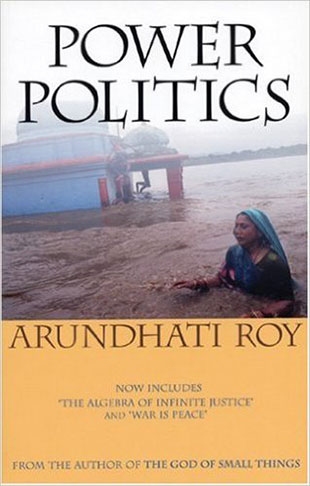Arundhati Roy was trained as an architect. She is the author of the novel The God of Small Things, which won the Booker Prize. She lives in New Delhi, India. This paperback contains three essays in which the author shares her ideas about India's nuclear tests; the development debate, especially in regard to dams; and the privatization of the country's power supply by U.S.-based energy companies. Roy is an Eastern sister to the American novelist Barbara Kingsolver who shares her righteous indignation over the globalization of the world's economy in which poor people become pawns sacrificed in the economic chess game of the free market. Or, as Roy puts it: "To be a writer in a country that gave the world Mahatma Gandhi, that invented the concept of nonviolent resistance, and then, half a century later, followed that up with nuclear tests is a ferocious burden. . . . To be a writer in a country where something akin to an undeclared civil war is being waged on its subjects in the name of 'development' is an onerous responsibility. When it comes to writers and writing, I use words like 'onerous' and 'responsibility' with a heavy heart and not a small degree of sadness."
Roy lives in New Dehli, a city in which close to 40 percent of the population, about five million people, live in slums and unauthorized colonies. Most of them do not have the luxury of municipal services such as electricity, water, and sewage systems. More than 50,000 are homeless and sleep on the streets. "Of course India is a microcosm of the world. Of course versions of what happens there happen everywhere. Of course, if you're willing to look, the parallels are easy to find. The difference in India is only in the scale, the magnitude, and the sheer proximity of the disparity. In India your face is slammed right up against it."
Roy is convinced that the powerful force behind all of this suffering and inequity is globalization whose advocates try to pass it off as a movement to eradicate world poverty. She sees it as "a mutant variety of colonialism, remote controlled and digitally operated." Most people aren't paying a lot of attention to it; after all, it's not a war or genocide: "It makes for bad TV. It has to do with boring things like jobs, money, water supply, electricity, irrigation. But it also has to do with a process of barbaric dispossession on a scale that has few parallels in history." Through her writing, Roy practices a politics of opposition to the construction of gigantic dams which will displace 56 million poor and illiterate Indians. For her efforts she has been harassed and severely criticized.
Roy speaks out vehemently against the hypocrisy of the International Coalition Against Terrorism which she sees a cabal of the richest countries in the world: "Between them, they manufacture and sell almost all of the world's weapons. They possess the largest stockpile of weapons of mass destruction-chemical, biological, and nuclear. They have fought the most wars, account for most of the genocide, subjugation, ethnic cleansing, and human rights violations in modern history, and have sponsored, armed , and financed untold numbers of dictators and despots. Between them, they have worshipped, almost deified, the cult of violence and war. For all its appalling sins, the Taliban just isn't in the same league."
The author concludes: "There is no easy way out of the spiraling mass of terror and brutality that confronts the world today. It is time now for the human race to hold still, to delve into its wells of collective wisdom, both ancient and modern." We agree, and that is why it is imperative to look to the exemplars of peace and nonviolence, to learn from those who have faced and overcome deprivation in the past, and to savor the stories that can lift our spirits and draw us closer to others who share our fears about the present and our anxieties about the future. We need to hear Arundhati Roy's righteous indignation over the widespread and dehumanizing injustices of our time.
